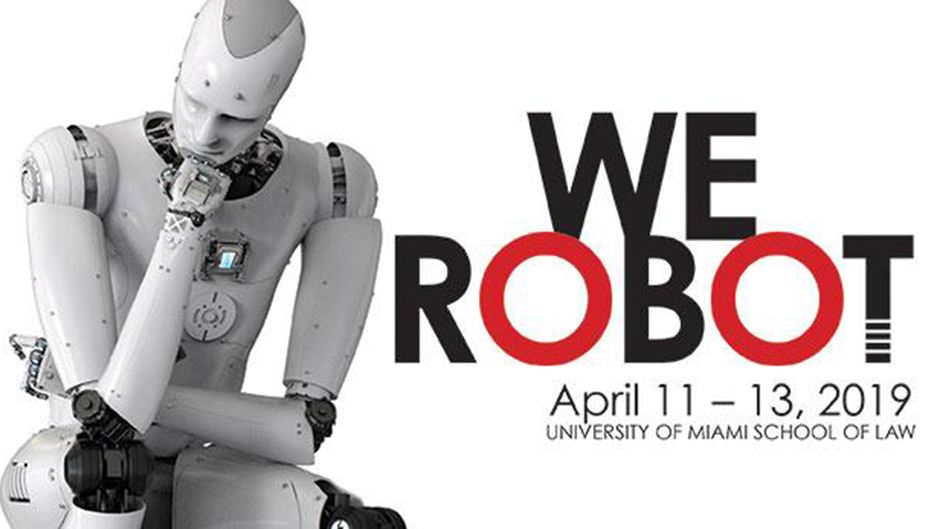CORAL GABLES, Fla. (September 5, 2018) – We Robot 2019 invites submissions for the 8th annual robotics law and policy conference, to be held at the University of Miami in Coral Gables, Florida, USA, on April 11-13, 2019.
We Robot 2019 seeks contributions by American and international academics, practitioners, and others, in the form of scholarly papers, technological demonstrations, or posters.
“We Robot fosters conversations between the people designing, building, and deploying robots and the people who design or influence the legal and social structures in which robots will operate,” said A. Michael Froomkin, founder of We Robot. “We particularly encourage papers that reflect interdisciplinary collaborations between developers of robotics, AI, and related technology and experts in the humanities, social science, and law and policy.”
The annual conference builds on a growing body of scholarship exploring how the increasing sophistication and autonomous decision-making capabilities of robots and their widespread deployment everywhere from the home, to hospitals, to public spaces, to the battlefield disrupts existing legal regimes or requires rethinking policy issues.
We Robot is a single-track conference, accepting roughly 15% of the proposals received. Paper proposals are blind reviewed, leading to a wide variety of presenters in terms of both disciplinary background and seniority -- ranging from graduate students to senior professors and even the occasional policymaker or entrepreneur. Many are written by interdisciplinary teams. Past conferences have included presentations on:
- What it’s like to work next to a robot on the assembly line
- Whether it makes sense to allow revenge against robots
- Optimal tax policy for robots
- Whether AI will make so many discoveries “obvious” that it will undermine the Patent system · Whether tricking a robot amounts to illegal ‘hacking’ under federal law
- How robot referees might change sports
- A feminist view of drone regulation
- How difficult it is to write programs to enforce even simple traffic rules
- Long-run implications for doctors and patients when machine learning systems start beating doctors at diagnosis
- The private sector’s role in governing autonomous weapons systems
- How putting a ‘human in the loop’ plus bad system design can result in making the human the fall guy when something goes wrong
- Whether real-life RoboCops would achieve – or set back – the goals of Black Lives Matter
- Under what circumstances the First Amendment should apply to AI-generated speech
Previously, the conference has been held at the University of Miami, University of Washington, Stanford, and Yale.
The University of Miami’s mission is to educate and nurture students, to create knowledge, and to provide service to our community and beyond. Committed to excellence and proud of the diversity of our University family, we strive to develop future leaders of our nation and the world. www.miami.edu
The University of Miami School of Law’s mission is to foster the intellectual discipline, creativity, and critical skills that will prepare its graduates for the highest standards of professional competence in the practice of law in a global environment subject to continual ― and not always predictable ― transformation; to cultivate a broad range of legal and interdisciplinary scholarship that, working at the cutting edge of its field, enhances the development of law and legal doctrine, and deepens society’s understanding of law and its role in society; and to fulfill the legal profession’s historic duty to promote the interests of justice. www.law.miami.edu

